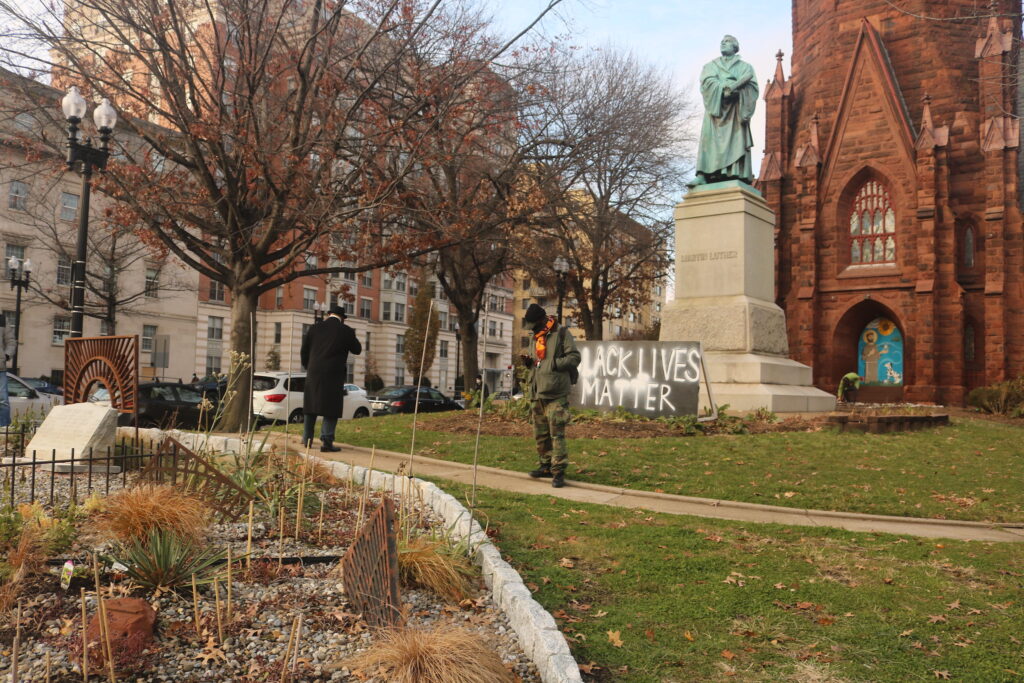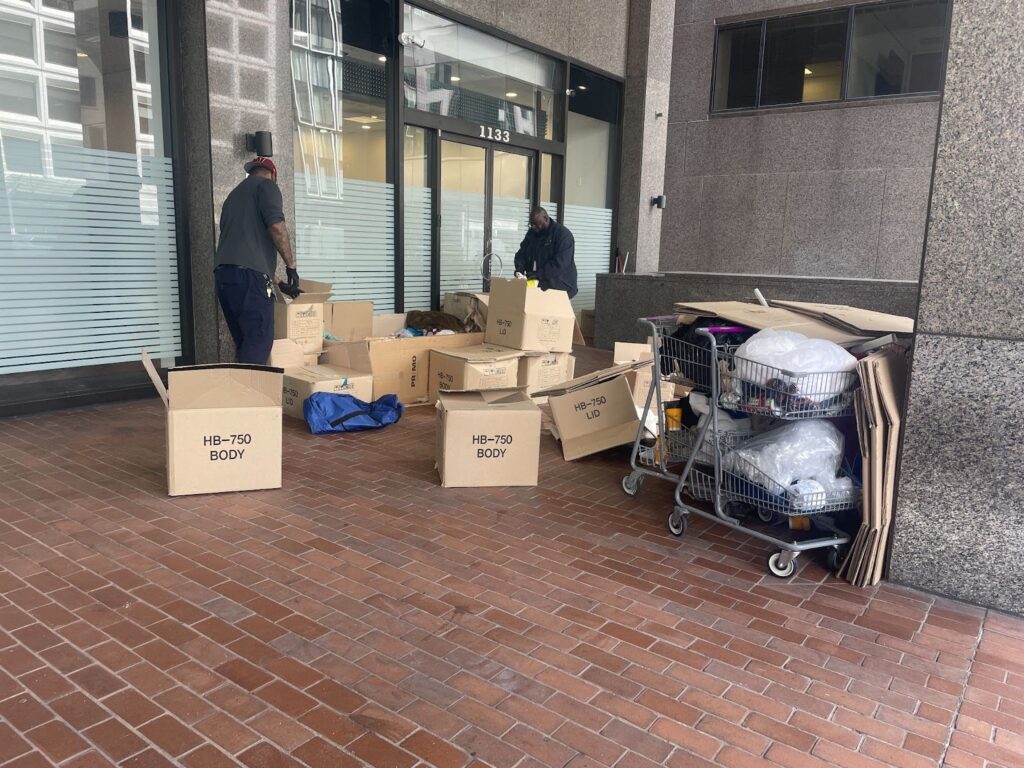Community members gathered at Luther Place Memorial Church Sunday afternoon to kick-off 24 hours of activities centered on one thing: remembering the more than 70 people known to have died “without the dignity of a home” this year. Twenty-three of them died from the coronavirus, according to city data, including two people within the past week.
At the time of last year’s vigil, 81 people experiencing homelessness were known to have died. But the D.C. Office of the Medical Examiner confirmed in a response to a FOIA request from the Washington Post that it had recorded 117 deaths.
The event looked radically different than the previous seven years that the People for Fairness Coalition has organized this overnight vigil. Last year, more than 100 people packed the nave of the church to hear from a host of advocates and officials. An intimate group of about 15 people gathered at this year’s event, where the crowd kept their distance. Others watched on a livestream set up by organizers.
The COVID-19 precautions weren’t the only change this year. The ceremony began with one of D.C.’s strongest advocates in the fight to prevent and end homelessness finding his final resting place. The ashes of Michael Stoops, who co-founded National Homeless Persons’ Memorial Day in 1990, were solemnly spread in the churchyard where the ashes of a number of homeless people have been buried. He died in 2017.

Stoops would have wanted to find a resting place at a church with ties to the homeless community and near the remains of fellow advocate Mitch Snyder, said Megan Hustings, deputy director of the National Coalition for the Homeless. Throughout the 80s, Stoops and Snyder fasted and slept on grates together while working to recruit record numbers of people to pressure Congress to do more for the homeless community. Snyder’s ashes were scattered in the Luther Place churchyard in 1999 and his name is included with 13 others on a memorial headstone there.
[Read more: Activists redefined America’s response to homelessness]
Stoops helped to establish the National Coalition in the early ‘80s and was a staff member there from 1988 until his death. “He was the most amazing person to be around — especially doing this work, because he was so passionate, so knowledgeable,” Hustings said.
[Disclaimer: Michael Stoops was a founding board member of Street Sense Media]
He helped pass the largest federal government response to the homelessness crisis, the McKinney-Vento Homeless Assistance Act, which led to food stamps, section 8 housing, and more. Stoops pushed the government to track hate crimes against homeless people — the National Coalition just published its 20th annual report on hate crimes against people experiencing homelessness. He was also committed to educating young people about advocacy for the community he cared so much about.
“He put a lot of effort, a lot of energy into getting interns, getting young people involved in one way or another, and teaching them what the reality is of homelessness and making sure that they really understood what was going on,” she said.
Stoops’s spirit inspired Hustings to continue her work advocating for people experiencing homeless even after he died. He created a movement in the future generations he invested in, she said. Anti-discrimination legislation that the D.C. Council recently chose not to advance had been named in honor of him.
After respects had been paid to Stoops, People for Fairness Coalition Reginald Black kicked off a series of speakers calling for more investment in preventing and ending homelessness. He raised awareness for the proposed “Vacant to Virus-Reduction” plan to turn 10,000 vacant units in D.C. into shelter for people experiencing homelessness. Unsheltered people need housing now to properly socially distance, especially because of the virus’s disproportionate effect on the vulnerable community, Black said.
“This is our official vigil event, but the vigil continues 365 days a year,” Black says. “I was out here for 10 years. I didn’t get a holiday off for living in that situation. So that’s how we work.”
He points to the extreme racial injustice in who experiences homelessness in DC pic.twitter.com/0O9v7d4wAh
— Street Sense Media (@streetsensedc) December 20, 2020
“You have a public health emergency, and you still have at least in two wards, up to 200 people that live outside,” he said. “We don’t even let dogs and cats live that way, so why are we letting our fellow humans live that way?”
Washington, D.C, has the highest rate of homelessness in the country with 93 out of every 10,000 people experiencing homelessness, according to a study by the National Alliance to End Homelessness.
“At some point, I don’t want to be doing this every winter solstice,” Black said. “It’s just unconscionable that we have a situation like we have here today.”
Rev. Karen Brau, the senior pastor at Luther Place, called on government officials to work harder to care for unhoused Washingtonians. She said the memorial is a reminder of those lost and a push forward. “We mourn together their loss and we call this opportunity for God’s justice that we have to do better,” she said.
“It is an indictment of the system we live in that people die without a home,” says @KarenBrau of @LutherPlace. “We are the ones that have to take care of each other.”
She calls on city leaders to “do better.” pic.twitter.com/bMJtYLD9MI
— Street Sense Media (@streetsensedc) December 20, 2020
One official, Ward 2 Councilmember Brooke Pinto, whose district includes both Luther Place and Freedom Plaza, joined the event remotely. “Everybody has and should have a right to housing and to live in dignity and to die in dignity,” she said over Zoom. “I’m so grateful to have you all as partners as we fight for housing and to move people into housing. I pledge to be a partner in that fight every day.”
Robert Warren, the director of People for Fairness Coalition, said the pandemic has been hard on the homeless community this year, with 23 coronavirus-related deaths. He thanked volunteers for continuing to do outreach into encampments and other parts of the community during a challenging time.
[Read more: Mutual aid groups help encampment residents gear up for hypothermia season]
He added that it’s frustrating not seeing any change in who is dying on the streets. People over the age of 55, people who face economic discrimination and people who should have had access to housing continue to be vulnerable.
“It seems like every year gets harder and harder, every year, remembering folks that we grew up with, definitely been homeless with, that we’ve worked with,” Warren said.
Leaders and members of the community walked to Freedom Plaza to continue the overnight vigil where there was enough space for members of the public to join in while following CDC guidelines. The group chanted Homeless lives matter, too!” and “Housing is a human right! Fight! Fight! Fight!” as they went.
Eric Falquero contributed reporting.








